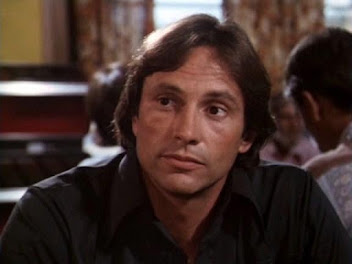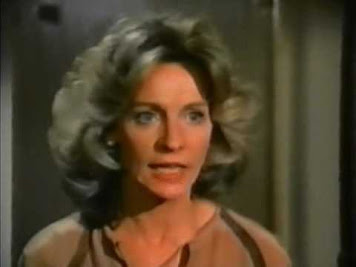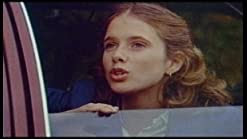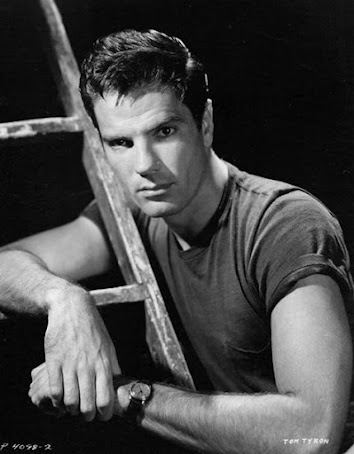Make thee the corn. It’s Harvest Time.
The Dark Secret of Harvest Home is one of my Halloween horror guilty pleasures. This 1978 NBC miniseries directed by Leo Penn is intriguingly themed, intricately plotted and suspenseful, and surprisingly well-acted by a cast of veteran TV actors and one legendary star, as it hurtles to a startling conclusion worthy of The Wicker Man and the more recent Midsommar.
David Ackroyd, handsome leading man and veteran of 1970s soap operas including Secret Storm and Another World, plays Nick Constantine, a beleaguered NYC advertising executive and frustrated painter. His marriage to neurotic Beth (Joanna Miles of Dallas and Chicago Hope) is troubled, and their high-strung teenage daughter Kate suffers from asthma. As the story unfolds, these stressed-out city folk decide to seek out a simpler way of life in the quaint fictional village of Cornwall Coombe, Connecticut.
 |
| David Ackroyd as Nick Constantine |
 |
| Joanna Miles as Beth Constantine |
On a Sunday drive to the country, crossing the Lost Whistle Bridge, the Constantines find themselves in a Brigadoon-like village suspended in time, resembling an Amish or Mennonite sect with its picturesque charm.
Cornwall Coombe is a farming community, and life there is all about the land—and the corn. It’s their lifeblood, their livelihood, their way of life. Their quaint and engaging seasonal festivals (Planting Day, Agnes Fair, Ploughing Day, Harvest Home et al) are steeped in tradition—with a sinister subtext.
All these folksy festivities, of course, are actually pagan rites and rituals to a dark and mysterious fertility goddess. Every seven years, a lucky young man is elevated to the status of Harvest Lord and paired with a lovely Corn Maiden, and then sees his farming prosper. The prime directive is “Make thee the corn.” (Think hieros gamos.)
Though the Constantines are charmed by their new bucolic lifestyle, Nick has many unanswered questions. The engine that drives the story is his overweening curiosity to discover “the secret that no man can know and no woman will tell.” (Be careful what you wish for.)
 |
| Bette Davis as the Widow Fortune |
At the center of Cornwall Coombe’s tight-knit community is the town matriarch, the feisty and commanding Widow Fortune, who serves in capacities ranging from mayor to midwife to landlord, and more. The Widow’s charms and potions are more efficacious than any doctor’s at curing their daughter’s asthma, and she promises to help Beth get pregnant.
During Sunday church services, we see who’s really in charge as the male pastor steps aside and the Widow ascends to the altar, her arms outstretched, to address the congregation.
The Widow Fortune is the last great role for Miss Bette Davis, whose flagging career had been revitalized by the gothic thriller genre with Whatever Happened To Baby Jane, Hush, Hush Sweet Charlotte and The Nanny decades before, and kept her working steadily in the horror genre through Burnt Offerings the previous year.
A famous New Englander herself, Davis has a field day in the pivotal role of the Widow Fortune displaying a perfect Nor’East dialect (remember those old Pepperidge Farm commercials?) and a clipped, no-nonsense delivery of old-world wisdom and aphorisms, herbal remedies and old wives’ tales. “Ai’yah.”
Though steeped in the occult, the only supernatural effects we experience in Harvest Home are the series of coincidences that bring the Constantines to Cornwall Coombe, events that seem to arrange themselves. The family has a flat tire right in front of the Lost Whistle Bridge, and it just happens to be Planting Day. And later when daughter Kate has what seems to be a fatal asthma attack and the doctor pronounces her dead, the Widow Fortune steps in to perform an emergency tracheotomy and restores the girl to life.
 |
| Rosanna Arquette as Kate Constantine |
 |
| Tracey Gold as Missy Penrose...no, she never calms down |
The cast is first-rate and a who’s who of 1970s and 1980s TV and film actors. A young Rosanna Arquette (Desperately Seeking Susan) is arresting in one of her first roles, as Ned and Beth’s daughter Kate.
Michael O’Keefe (Caddyshack) is Worthy Pettinger, the Young Harvest Lord who turns his back on the old ways and is shunned by the community, and that’s just for starters. (“God curse the corn and God damn the Mother!” is something one should never say…there will be consequences.)
Young Tracey Gold (so cute on Growing Pains) is absolutely terrifying as a little girl on the autistic spectrum believed to have the power of augury, choosing the next Harvest Lord.
Tinker Jack Stump, played by veteran character actor Rene Auberjonois (Star Trek: Deep Space Nine) suffers a brutal attack in which his tongue is cut out to keep him quiet about some of Cornwall Coombe’s dark secrets (and there are many.)
Also effective in their roles are John Calvin and Laurie Prange as Justin and Sophie Hooke, the Harvest Lord and Corn Maiden who dutifully play their roles in the ominous Corn Play Pageant, on stage and in real life.
 |
| Donald Pleasence—the voice of doom |
Adding to the eerie, quietly sinister aura of Cornwall Coombe is the sonorous and hypnotic, unmistakable voice of the great Donald Pleasence (Eye of the Devil, Halloween) as he reads classic tales via the audio books of blind neighbor Robert Dodd, next door to the Constantines. From the neighbor’s tape recorder we hear tantalizing snippets of The Three Musketeers, A Tale of Two Cities, Great Expectations and David Copperfield. As always, Pleasence’s impeccably articulate British tones have a menacing and ominous undercurrent.
The compelling story is the work of Tom Tryon, a former actor (The Cardinal) who turned to writing after his film career failed. Riding the occult wave of Ira Levin’s wildly successful Rosemary’s Baby (and its even more iconic 1968 film version) Tryon’s novels Harvest Home and The Other became instant best-sellers. The Other was made into a 1971 theatrical film, and his short story Fedora (in his Hollywood-themed fiction anthology Crowned Heads) was filmed by the great Billy Wilder in 1978. The same year, Harvest Home was adapted into this NBC miniseries. Handsome Tryon, a closeted gay man and one-time partner of the porn star Casey Donovan, died in 1991.
 |
| Author Thomas Tryon |
Unfortunately, The Dark Secret of Harvest Home is currently not yet available in a remastered complete print. Thank goodness the series was rebroadcast in its entirety (total of 3 hours and 48 minutes) on the TNT channel in the 1990s, where an enterprising film lover captured it, albeit in a very grainy home-made videotape transfer with some scenes still bearing the TNT logo. However, it’s such a compellingly told story that I find it watchable and absorbing even in this substandard form. It was a must-have horror title for my library.
Make thee the corn. Ai’yah.
This is an entry in the Devilishly Delightful Donald Pleasance Blogathon, hosted by Realweegiemidget Reviews and Cinematic Catharsis. Happy Halloween, everyone!



















